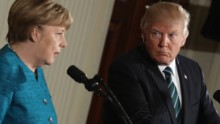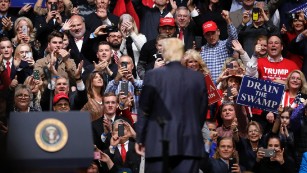Trump stands by wiretapping claim during Merkel visit
President Donald Trump on Friday refused to disown claims, highlighted by his White House, that British intelligence tapped his phones following a request by President Barack Obama last year, risking a deepening rift with America's key ally.
Trump's aides had earlier attempted to quell British anger over the claims, based on a Fox News report cited by his press secretary, Sean Spicer, in a briefing Thursday, by explaining the comment to the UK government.
But in an awkward moment on live television while meeting Chancellor Angela Merkel -- whose cell phone was once tapped by the National Security Agency -- Trump quipped that he and the German leader had something in common.
Trump's response further fueled a controversy about his claims he was wiretapped by Obama -- first made on Twitter two weeks ago -- which have been rejected by senior members of House and Senate Intelligence committees. The White House has produced no evidence to back up the allegations.
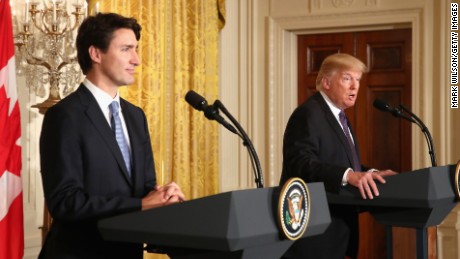
Trump defends ban, Trudeau has opposing view
Trump welcomes Merkel after bashing her
In a news conference notable for tense body language between Trump and Merkel, the President appeared irritated by the question from a German reporter about the unverified Fox News report.
"As far as wiretapping I guess by this past administration, at least we have something in common, perhaps," Trump said, turning to Merkel, who did not smile at the joke. The German chancellor was furious to find out during the last administration that her phone had been tapped by the NSA as part of a program that Obama ended after leaks from Edward Snowden.
Merkel appeared to take several seconds to process what Trump had said, then frowned, and started shuffling her papers on the podium set up for their joint news conference in the East Room of the White House.
Trump also showed no sign of regret that his press secretary had sparked a controversy, though the President is increasingly isolated over his claims, made without any evidence, that the Obama administration tapped his phones.
The top Republicans and Democrats on the House and Senate Intelligence panels have said there is no evidence that Trump or aides were under surveillance. On Monday, FBI director James Comey is expected to testify to the House committee and is expected to draw similar conclusions.
The White House earlier sought to explain Spicer's use of the Fox News report to the British government. National security adviser H.R. McMaster spoke with his British counterpart and described Spicer's comment as "unintentional." A senior administration official said the conversation amounted to an apology.
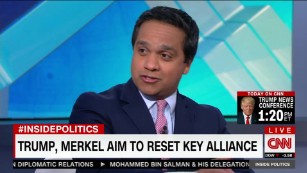
Trump-Merkel Meeting
But Trump declined to offer an apology for the claims, which the British government derided as "ridiculous."
And Spicer denied to reporters after the news conference that the White House had said sorry to the British.
"We just reiterated the fact that we were just simply reading media accounts. That's it," he said. "I don't think we regret anything. We literally listed a litany of media reports that are in the public domain."
The controversy over wiretapping overshadowed other aspects of Merkel's visit -- a crucial one for US and German relations. Trump met Merkel at the front door of the West Wing, but there were signs of strained interaction a little later when they appeared before cameras in the Oval Office.
When asked to shake hands by reporters and photographers, Trump remained stationary. He did not look at Merkel, although it was not clear whether the leaders heard the request.
Later, in the news conference, Trump expressed strong support for NATO, following his criticism of the alliance during his election campaign. But he also knocked members who do not pay their "fair share" for their defense.
"Many nations owe vast sums of money from past years and it is very unfair to the United States. These nations must pay what they owe," Trump said.
US presidents have long been frustrated that many nations do not reach their commitment to spend 2% of GDP on defense. Germany is among those nations, although the US leader thanked Merkel for Germany's commitment to increase spending and to work towards that figure.
Trump also said that the US would respect "historic institutions" in what may have been a reference to the European Union, which has always been seen by the US as a bulwark of Western security, but about which senior figures in Trump's government have expressed skepticism.
But the President also said that the US would "recognize the right of free people to manage their own destiny," an apparent reference to the British vote in a referendum to leave the European Union last year, which dismayed Merkel and drew an endorsement from Trump.
The German leader made a point to say that her nation's success relied on "European unity and European integration."
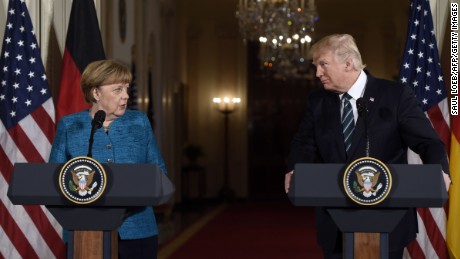
Peer to peer: Merkel's first meeting with Trump
"That's something of which I am deeply convinced, and I am not only saying this back home, I am saying this here, I am saying it in the United States, also here in Washington in my talks with the President," she said.
In her remarks, Merkel also referred to past tensions with Trump, as she seeks to build a new relationship with the third US president she has encountered as German chancellor.
"It's always much better to talk to one another than about one another," she said.
Merkel also said she was glad to hear Trump's support for NATO and said the President had committed to the Minsk process, designed to monitor a ceasefire in Ukraine and look toward an eventual solution to the crisis.
Apart from the domestic political storms that are battering the White House, the news conference and Merkel's visit to the White House are coming at a crucial moment for US-German relations.
The German chancellor is trying to forge a relationship with Trump despite suspicion over his political views. She congratulated the President after his election win in a statement that also contained a defense of Western values amid concern in Germany that his stances on issues like immigration run counter to the principles that have sustained the Western alliance.
Germany, the most powerful political force in the European Union, has also been deeply concerned by Trump's criticisms of NATO and deep skepticism inside the White House about the EU itself.
Donald Trump's words are catching up to his presidency
Friday's meeting was an attempt to stir some personal chemistry between two leaders who seem far removed in temperament and instinct.
Merkel, who takes a cautious, analytical approach to politics, was also one of the few world leaders who appeared to forge a deep connection with Obama, with whom she was something of a kindred spirit.
Trump is more outspoken and improvisational and has little time for diplomatic niceties. He has, for example, heavily criticized Merkel's decision to allow hundreds of thousands of refugees into Germany, a move that is a key issue in her re-election race this year.
But both sides are trying to move on from past tensions. The pragmatic Merkel is now on her third US president and appears to be looking to find a way to forge a relationship with Trump without buying into his political values.
Another administration official said before the meeting that the President hoped to get Merkel's advice for dealing with Russian President Vladimir Putin, who according to US intelligence ordered cyber-meddling in last year's presidential election and tried to help Trump.
Merkel hoped to appeal to the President's focus on business, bringing the chief executives of Siemens and BMW with her to Washington with her to Washington.
The two companies employ thousands of American workers, a point Merkel hopes will come through when the pair get to discussing trade issues -- including Germany's trade surplus, which has rankled the Trump camp.
News Courtesy: www.cnn.com

